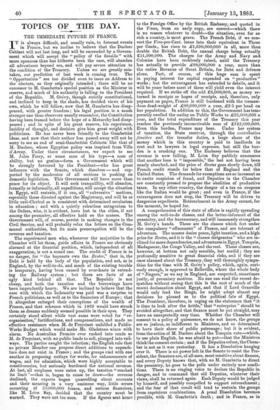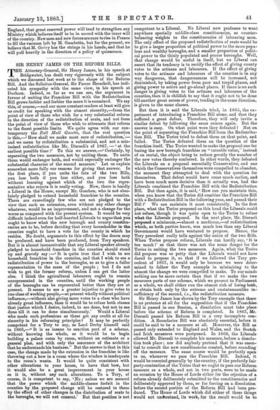TOPICS OF THE DAY.
THE IMMEDIATE FUTURE IN FRANCE.
IT is always difficult, and usually vain, to forecast events in France, but we incline to believe that the Daclerc Cabinet will not last long, and will be succeeded by a Govern- Meat which will swept the " policy of the fireside " with more openness than has hitherto been the case, will abandon all adventures beyond sea, and will pay severe attention to the condition of the Treasury. Unless we are greatly mis- taken, our prediction of last week is coming true. The " Opportunists " are too divided even to issue an Address to the electors, as they originally intended ; there will be no successor to M. Gambetta's special position as the Minister in reserve, and much of his authority is falling to the President of the Republic. M. Grevy, though strictly constitutional, and inclined to keep in the shade, has decided views of his own, which he will follow, now that M. Gambetta has disap- peared, with greater freedom ; his legal position is a much stronger one than observers usually remember, the Constitution having been framed before the hope of a Monarchy had disap- peared ; and in spite of his great reserve, his experience, lucidity of thought, and decision give him great weight.with politicians. He has never been friendly to the Gambettist ideas, and now that their author has passed away will not be sorry to see an end of semi-Gambettist Cabinets like that of M. Duclerc, whose Egyptian policy was inspired from Ville d'Avray. Under these circumstances, we expect to see M. Jules Ferry, or some man of his type—a man of ability, but no genius—form a Government which will be strongly favoured by the President—who has great influence with the Senate, which dissolves — and sup- ported by the moderates of all sections in pushing on domestic legislation. This Government will have more than peace for its object. It will seek tranquillity, will abandon, formally or informally, all expeditions, will accept the situation in Egypt, will restrain, if it can, all " subversive " motions, especially those directed against the Magistracy, and will be as little anti-Clerical as is consistent with determined secularism in education ; and with a quietly relentless antagonism to the Orders, who, it is evident, have lost in the cities, if not among the peasantry, all effective hold on the masses. The Government will, of course, persist in making changes in the Civil Service, and will probably relax the fetters on the Com- munal authorities, but its main preoccupation will be the revenue and taxation.
The experienced men who, whenever the majorities in the Chamber will let then guide affairs in France are obviously alarmed at the financial position, which, independent of all exaggeration, is not a sound one. The credit of France is in no danger, for "the bayonets own the Renter," that is, the Debt is held by the body of the population, and not, as in England, by the well-to-do, and much of the existing trouble is temporary, having been caused by over-haste in extend- ing the Railway system ; but there are facts of an ugly kind behind all that. The Republic is not cheap, and both the taxation and the borrowings have been imprudently heavy. We are inclined to believe that the ease with which the Indemnity was paid was a surprise to French politicians, as well as to the financiers of Europe ; that it altogether enlarged their conceptions of the wealth of France, and that schemes which in 1869 would have struck them as dreams suddenly seemed possible in their eyes. They certainly stood silent while vast sums were voted for "re- organisation," fortifications, and compensations, and made no effective resistance when k de Freycinet unfolded a Public- Works Budget which would make Mr. Gladstone wince with alarm. No Australian Premier ever rushed into roads as M. de Freycinet, with no public lands to sell, plunged into rail- ways. The pasties caught the infection; the English rule that no private Member can propose direct additions to expendi- ture does not exist in France ; and the groups vied with one another in proposing outlays for works, for enhancements of wages, and for education, which were highly acceptable to constituencies, but seriously burdened the national revenue. At last, all surpluses were eaten up, the taxation " reached its limit "—that is, began to cease to draw—the revenue declined, the experts began quarrelling about accounts and their meaning in a very ominous way, little errors occurring of 50,000,000 francs, and serious financiers, like M. Leon Say, decided that the country must be warned, They were not too soon. If the figures sent home to the Foreign Office by the British Embassy, and quoted in the Times, from an early copy, are correct—which there is no reason whatever to doubt—the situation, even for so, rich a country, is most grave. The French Debt, if we con- vert the Five-per-Cent. loans into their equivalent in Three per Cents., has risen to £1,690,000,000 in all, more than double the British Debt, the annual charge being actually £51,300,000. The charges for the Army and Navy and Colonies have been recklessly raised, until the Treasury has actually to provide £88,000,000 a year, more than the entire Revenue of Great Britain, for Debt and defence- alone. Part, of course, of this huge sum is spent in paying interest for capital expended on " productive" works ; but the extravagance has extended to details, and it will be years before most of these will yield even the interest required. If we strike off the odd £8,000,000, as money re- turned in receipts or hopes of receipts, and, therefore, only payment on paper, France is still burdened with the tremen- dous dead-weight of £80,000,000 a year, £2.5 per head on her population. In addition to this, the Government has tem- porarily swelled the outlay on Public Works to £23,000,000 a year, and the total expenditure of the Treasury this year reaches the previously inconceivable sum of £142,000,000. Even this burden, France may bear. Under her system of taxation, the State receives, through the contribution fonciere and the transfer duties, a large share of the money which in this country is paid to landlords in rent and to lawyers in legal expenses, but still the bur- den is a crushing one. The Embassy believes that the- revenue is now falling, M. Leon Say publicly announces that another loan is " impossible," the last not having been nearly absorbed, and the price of Rentes goes slowly down, till French credit stands far below that of England and the United States. The demands for exemptions are so incessant as- to excite suspicion of fraud, and Deputies in the Chamber are constantly pressed to propose the abolition of productive taxes. In any other country, the danger of a tax on coupons. like the Italian would be great ; and even in France, if the extravagance does not stop, the Treasury will be driven to dangerous expedients. Retrenchment in the Army cannot, for the moment, be hoped for.
A comprehension of this state of affairs is rapidly spreading among the well-to-do classes, and the better-informed of the peasantry, and the bureaucracy, and will immensely strengthen M. Grevy's hands. These are the classes which fret under the compulsory "effacement" of France, and are tolerant of adventure. The masses desire peace, light taxation, and a high price for Renter, and it is the " classes dirigeantes" who are in- clined for more dependencies, and adventures in Egypt, Tonquin, Madagascar, the Congo Valley, and the rest. These classes are,. however, at bottom not only sensible, but sordid ; they are profoundly sensitive to great financial risks, and if they are once alarmed about the Treasury, they will thoroughly sympa- thise for the time with M. Grevy's policy, which, again, curi- ously enough, is approved in Belleville, where the whole body of "Jingoes," as we say in England, are suspected, sometimes justly, of pecuniary motives. No one can read the recent de- spatches without seeing that this is the root of much of the recent declamation about Egypt, and that if Lord Granville would only feed the Rings, he might adopt almost any decisions he pleased as to the political fate of Egypt. The President, therefore, in urging on the statesmen that "it is time to look after the kettle," that " enterprise " should be avoided altogether, and that finance must be put straight, may have an unexpectedly easy time. Whether the Chamber will consent to a policy of quiescence, we do not know, the groups are so jealous, so indifferent to Ministers, and so determined to have their share of public patronage ; but it is evident, from the action of M. Duclerc about the Tonquin vote—which, to use plain English, he was afraid to put—that the Ministers thinkthe consent certain ; and if the Deputies refuse, the Cham- ber is not as it was yesterday. It has a Dissolution hanging over it. There is no power left in the Senate to resist the Pre- sident, the Senators are, of all men, most sensitive about finance, and every Deputy knows that, with no M. Gambetta to direct the peasantry, he goes to the polls under entirely new condi- tions. There is no ringing voice to declare the Republic in danger, and to command that old Deputies, whatever their views, shall be returned again: Each Deputy would be judged by himself, and possibly compelled to support retrenchment ; and the fear of that result will tend to restrain the groups from capricious combinations. A penal Dissolution becomes possible, with M. Gambetta's death ; and in France, as in
England, that great reserved power will tend to strengthen any Ministry which believes itself to be in accord with the inner will of the country. New men and new forces are sure to rise in France to fill the vacuum left by M. Gambetta, but for the present, we believe that M. Giaivy has the strings in his hands, and that he will pull heavily in the direction of a policy of quiescence.



































 Previous page
Previous page